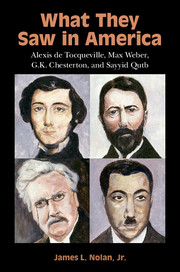Book contents
- Frontmatter
- Dedication
- Contents
- Acknowledgments
- Introduction
- 1 Pride, Patriotism, and the Mercantilist Spirit: Tocqueville and Beaumont Discover America
- 2 Tocqueville and the Quandary of American Democracy
- 3 Agrarianism, Race, and the End of Romanticism: Weber in Early Twentieth-Century America
- 4 Weber on Sects, Schools, and the Spirit of Capitalism
- 5 A New Martin Chuzzlewit: Chesterton on Main Street
- 6 Chestertonian Distributism and the Democratic Ideal
- 7 From Musha to New York: Qutb Encounters American Jahiliyya
- 8 Qutb's “Inquiring Eyes” in Colorado and California
- Conclusion
- Notes
- References
- Index
3 - Agrarianism, Race, and the End of Romanticism: Weber in Early Twentieth-Century America
Published online by Cambridge University Press: 05 April 2016
- Frontmatter
- Dedication
- Contents
- Acknowledgments
- Introduction
- 1 Pride, Patriotism, and the Mercantilist Spirit: Tocqueville and Beaumont Discover America
- 2 Tocqueville and the Quandary of American Democracy
- 3 Agrarianism, Race, and the End of Romanticism: Weber in Early Twentieth-Century America
- 4 Weber on Sects, Schools, and the Spirit of Capitalism
- 5 A New Martin Chuzzlewit: Chesterton on Main Street
- 6 Chestertonian Distributism and the Democratic Ideal
- 7 From Musha to New York: Qutb Encounters American Jahiliyya
- 8 Qutb's “Inquiring Eyes” in Colorado and California
- Conclusion
- Notes
- References
- Index
Summary
In August 1904, seventy-three years after the two French magistrates began their journey to America, Max and Marianne Weber departed from Germany for a visit to the United States. Traveling with the Webers, for the first part of the trip, was the German theologian, Ernst Troeltsch. Both Troeltsch and Weber had been invited to give lectures at the World Congress for Arts and Science in conjunction with the St. Louis World's Fair. Facilitating their invitation was Hugo Münsterberg, a German émigré, Harvard psychology professor, and one of the chief organizers of the Congress. Weber had previously planned to travel to America in 1893 for the World's Fair in Chicago, a trip that did not materialize because of his engagement to Marianne that year. Like Tocqueville, Weber was preceded to America by a relative – in this case, his father, Max Weber, Sr., who traveled to the United States in 1883, joining James Bryce, Carl Schurz, and Henry Villard for an excursion on the just completed Northern Pacific Railroad.
Weber had a long-standing interest in America, and not just because of his father's visit. When he was only eleven years old, family friend Friedrich Kapp gave him a translated copy of Benjamin Franklin's autobiography; and, at age fifteen, Weber wrote that he was studying American history and finding it quite interesting. His 1904 journey in America was much shorter than Tocqueville's: 2½ months compared to 9½ months. While Tocqueville traveled by coach and steamship, Weber traveled primarily by train; he estimated that he spent approximately 180 hours on America's railways and traversed a total of around five thousand miles. Though utilizing different modes of transportation, both visitors followed a similar geographical loop. As John Patrick Diggins observes, Tocqueville and Weber “traveled over many of the same routes and came away with many of the same impressions about this new nation and new people forming across the Atlantic.” Interestingly, though Tocqueville's influence on Weber was evident, a direct reference to Tocqueville in Weber's work has yet to be discovered.
Like Tocqueville and Beaumont, the Webers began their journey in New York. After five days in the city, they ventured west, stopping for visits in North Tonawanda, Niagara Falls, and Buffalo before taking a train to Chicago, where they stayed for more than a week.
- Type
- Chapter
- Information
- What They Saw in AmericaAlexis de Tocqueville, Max Weber, G. K. Chesterton, and Sayyid Qutb, pp. 66 - 92Publisher: Cambridge University PressPrint publication year: 2016



